|
|
|
Sort Order |
|
|
|
Items / Page
|
|
|
|
|
|
|
| Srl | Item |
| 1 |
ID:
107471
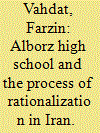

|
|
|
|
|
| Publication |
2011.
|
| Summary/Abstract |
As a leading foundational institution of modernity, Alborz High School under the leadership of Dr. Mohammad Ali Mojtahedi came to embody and promote techno-scientific (or instrumental) rationality that has been the dominant form of rationality in Iran in the twentieth and twenty-first centuries. The essay analyzes this form of rationality and its fostering by Alborz High School during the tenure of Mohammad Ali Mojtahedi. It is argued that while instrumental rationality is necessary for any developing country, it poses fundamental problems for the development of democratic ethos. Alternatively, Jürgen Habermas' notion of "communicative rationality" is proposed and analyzed as a way to complement and democratize Iranian approach toward rationality and modernity
|
|
|
|
|
|
|
|
|
|
|
|
|
|
|
|
| 2 |
ID:
153891
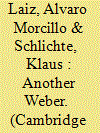

|
|
|
|
|
| Summary/Abstract |
While there has arguably been a partial reception of Weber in international relations (IR), we argue here that his ideas have either been misunderstood or neglected. In order to highlight the most valuable Weberian insights, we focus on two topics of crucial importance to IR. First, in our view, Weber's crucial contribution to the study of states is not his alleged emphasis on the monopoly of violence but his concern with the problem of legitimacy, which is the key to understanding why individuals actually orient an action according to their beliefs in the idea of a state. Second, Weber conducted seminal historical investigations on religion, the rationalization of economic ethics, and organizations that show that the diffusion of isomorphism has little to do with supposedly uninterested and persuasive scientific and professional associations. Instead, more attention should be paid to rational domination and less to reified concepts such as John Meyer's ‘rationalized otherhood’. These arguments are also examined empirically.
|
|
|
|
|
|
|
|
|
|
|
|
|
|
|
|
| 3 |
ID:
133349
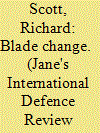

|
|
|
|
|
| Publication |
2014.
|
| Summary/Abstract |
By late 2020 the UK RN will have replaced its legacy helicopter fleet with new or upgraded rotocraft, Richard Scott charts the progress of the wildcat and Merlin programmes.
|
|
|
|
|
|
|
|
|
|
|
|
|
|
|
|
| 4 |
ID:
137168
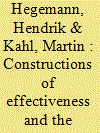

|
|
|
|
|
| Summary/Abstract |
This article argues that counterterrorism effectiveness is a distinct, discursive construction that politicians use to offer a rationalization of measures adopted under conditions of inherent uncertainty. Even in the face of multiple limits of knowability, decision makers need to offer “rational” justifications complying with persisting expectations of “evidence-based” policy and sound deliberation in modern societies. This article develops a new perspective on the political role of counterterrorism effectiveness highlighting the symbolic importance of knowledge claims and prevailing standards of modern rationality. It illustrates its arguments through a case study on the justification of biometric passports as an effective counterterrorist tool.
|
|
|
|
|
|
|
|
|
|
|
|
|
|
|
|
| 5 |
ID:
112504
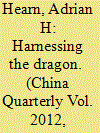

|
|
|
|
|
| Publication |
2012.
|
| Summary/Abstract |
Chinese communities resident in Mexico and Cuba face a common problem: their dealings with business partners in China are perceived as a threat to national interests. In Mexico this concern emanates from manufacturers unable to compete with Chinese imports, and is evident in antagonistic news media and acts of hostility against Chinese businesses. In Cuba it stems from the state's stewardship over economic sovereignty, and is evident in efforts to assimilate Havana's Chinatown and its entrenched informal sector into a centralized scheme of commercial regulation. Interviews with policy makers, local officials and Chinese entrepreneurs indicate that the "rationalization" of Chinese ethnic allegiances for the greater public good is a critical step towards alleviating tensions. I conclude that both countries can leverage benefits from overseas Chinese communities, but to do so they must support their entrepreneurial activities, harness their networks to promote targeted imports and exports, and develop more culturally sensitive regulations.
|
|
|
|
|
|
|
|
|
|
|
|
|
|
|
|
| 6 |
ID:
115837
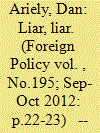

|
|
|
| 7 |
ID:
101094
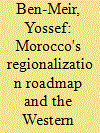

|
|
|
|
|
| Publication |
2010.
|
| Summary/Abstract |
King Mohammed VI of Morocco has announced a national regionalization plan that includes the Western Sahara. Morocco's intention is to regionalize (or, essentially, decentralize) decision-making authority and management in socioeconomic development, political affairs, the judicial system, and other important responsibilities and institutions. The author describes Morocco's roadmap to regionalization, analyzes its principal elements, and presents recommendations for its strategic implementation. Regionalization could potentially establish the necessary conditions to resolve the Western Saharan conflict, but only if it genuinely advances the political, social, economic, and environmental fulfillment of the people living there.
|
|
|
|
|
|
|
|
|
|
|
|
|
|
|
|
| 8 |
ID:
131243
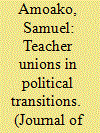

|
|
|
|
|
| Publication |
2014.
|
| Summary/Abstract |
The negotiation to end apartheid - which was initiated in secret in the 1980s - solidified in the 1990s when FW de Klerk unbanned the African National Congress (ANC), South African Communist Party (SACP), Pan African Congress (PAC) and other political and social movements, as well as struggle icons, prominent among whom was Mandela. The South African Democratic Teachers' Union (SADTU) emerged within the euphoria surrounding Mandela's release and the negotiations to end apartheid. SADTU combined its educational struggles with the political struggle to end apartheid rule. Drawing on documentary (mainly archival), newspaper reports and oral evidence, this article examines SADTU's struggles for recognition, its resistance against education restructuring, and its defiance campaign against inspection from 1990-1993. I suggest that SADTU's contentions during the period were rooted in the political struggle to end apartheid rule since it regarded the apartheid education departments as illegitimate structures needing to be dismantled. In addition, the socio-economic undercurrents that characterized the transition were carried into education restructuring and thus pushed SADTU into militancy.
|
|
|
|
|
|
|
|
|
|
|
|
|
|
|
|
| 9 |
ID:
121240
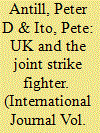

|
|
|
|
|
| Publication |
2013.
|
| Summary/Abstract |
The 20 years since the end of the Cold War have seen a radical shift in the
nature of the defence industrial sector, with a rationalization of the number
of companies involved. While something similar happened in the civilian
aerospace market, which has become dominated by two giant rivals-the
United States-based Boeing Corporation and the European consortium of
Airbus-it occurred over a much shorter timescale. For example, in the US
defence market Boeing merged with McDonnell Douglas in August 1997;
Lockheed and Martin Marietta merged in March 1995; while Northrop
Aircraft acquired Grumman Aerospace in April 1994.1
Today the defence
market is increasingly dominated by a smaller number of large multinational
companies that have global interests, such as Boeing, Lockheed Martin, General Dynamics, Northrop Grumman, Raytheon, EADS, Thales, and
BAE Systems. In conjunction with this slow but steady rationalization, most
western countries since the end of the Cold War have sought some form
of "peace dividend" and diverted resources from defence to other areas of
public expenditure.2
For example, the United Kingdom's defence expenditure
dropped as a percentage of Gross Domestic Product (GDP) from 4.6 percent
in 1987 to 2.56 percent in 2010. This drop mirrored much of what was
happening in the rest of NATO, with the average defence expenditure falling
from 1.93 percent in 2001 to 1.58 percent in 2010.3
|
|
|
|
|
|
|
|
|
|
|
|
|
|
|
|
| 10 |
ID:
123043


|
|
|
|
|
| Publication |
2013.
|
| Summary/Abstract |
In June, Hassan Rouhani was elected president of the Islamic Republic of Iran. Rouhani ran as a reform candidate, and many have interpreted his victory as a harbinger of a possible liberalization or rationalization of Iranian domestic and foreign policy. But the dominant figure in Iranian politics is not the president but rather the supreme leader, Ayatollah Ali Khamenei. The Iranian constitution endows the supreme leader with tremendous authority over all major state institutions, and Khamenei, who has held the post since 1989, has found many other ways to further increase his influence. Formally or not, the executive, legislative, and judicial branches of the government all operate under his absolute sovereignty; Khamenei is Iran's head of state, commander in chief, and top ideologue. His views are what will ultimately shape Iranian policy, and so it is worth exploring them in detail.
|
|
|
|
|
|
|
|
|
|
|
|
|
|
|
|
|
|
|
|
|